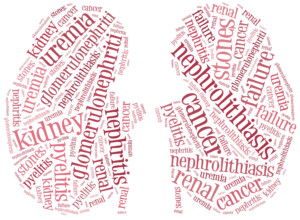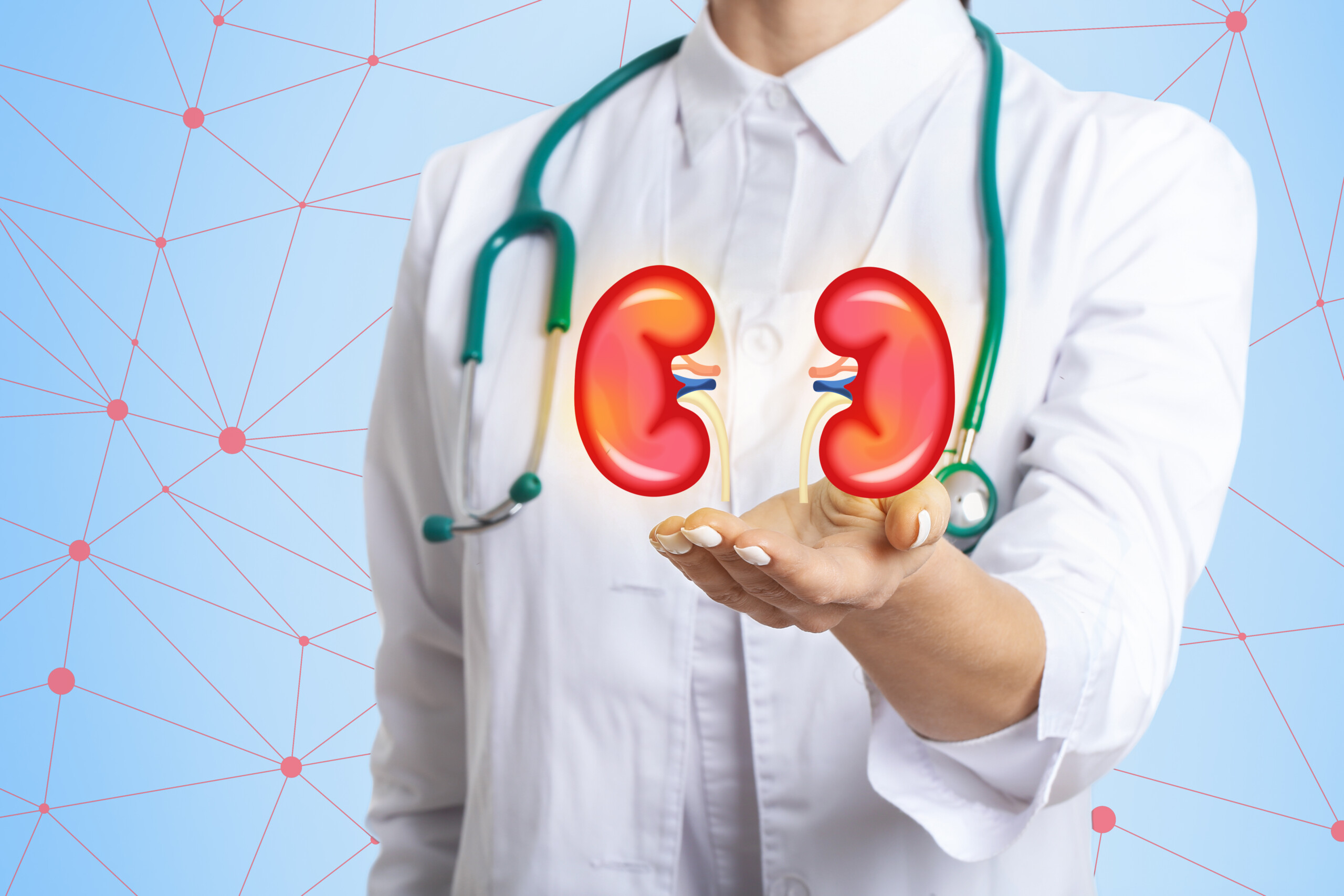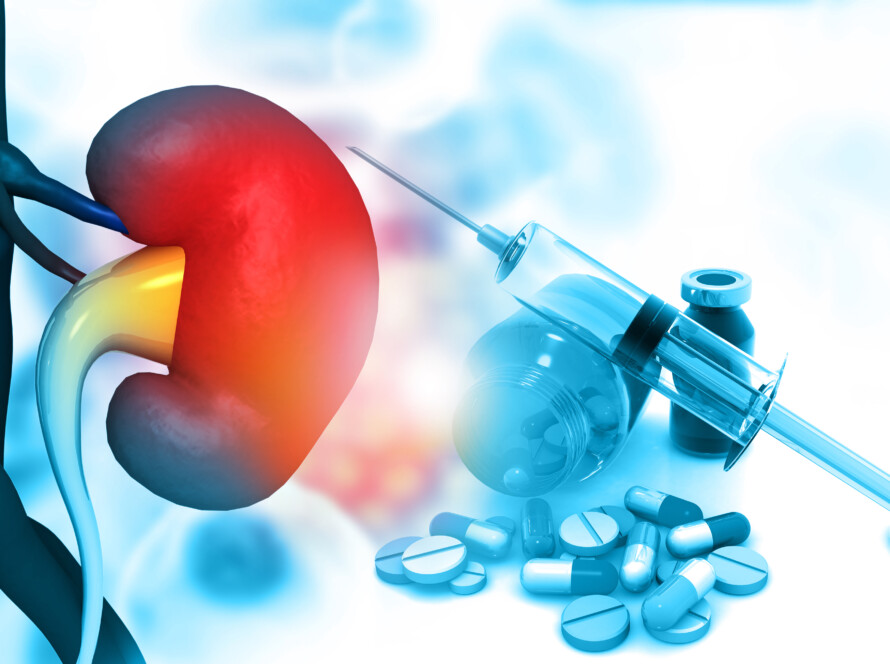Chronic Kidney Disease (CKD) is a prevalent and serious health condition characterized by the gradual loss of kidney function over time. It is a multifaceted condition with various underlying causes and risk factors that can significantly impact kidney health and overall well-being.
Risk Factors of CKD
- Diabetes: Diabetes mellitus, particularly type 2 diabetes, is a leading cause of CKD. Prolonged high blood sugar levels can damage the small blood vessels in the kidneys, impairing their function over time.
- High Blood Pressure (Hypertension): Uncontrolled hypertension can exert excessive pressure on the delicate blood vessels in the kidneys, leading to kidney damage and the development of CKD.
- Heart Disease and/or Heart Failure: Conditions such as heart disease and heart failure can compromise kidney function by reducing blood flow to the kidneys or causing fluid buildup, contributing to the onset or progression of CKD.
- Obesity: Obesity is closely linked to the development of CKD, as it increases the risk of conditions such as diabetes and hypertension, both of which are major contributors to kidney damage.
- Age: Advancing age is a significant risk factor for CKD, as kidney function naturally declines with age. Individuals over the age of 60 are at a higher risk of developing CKD.
- Family History: A family history of CKD or kidney failure can predispose individuals to the condition, highlighting the role of genetic factors in its development.
- Personal History of Acute Kidney Injury (AKI): Individuals who have experienced episodes of acute kidney injury (AKI), such as severe infections or dehydration, are at an increased risk of developing CKD in the long term.
- Smoking and Use of Tobacco Products: Tobacco use, including smoking and the use of other tobacco products, is associated with an elevated risk of CKD due to its detrimental effects on kidney function and overall cardiovascular health.
Other Causes of CKD
In addition to the common causes mentioned above, several other factors and conditions can contribute to the development of CKD, including:
- Glomerular Diseases: Conditions such as glomerulonephritis, IgA nephropathy (IgAN), and HIV nephropathy can cause inflammation and damage to the glomeruli, impairing kidney function.
- Inherited Conditions: Genetic disorders such as polycystic kidney disease (PKD) can lead to the formation of fluid-filled cysts in the kidneys, resulting in kidney damage and the progression of CKD.
- Autoimmune Conditions: Autoimmune diseases like lupus (lupus nephritis) can affect kidney function by causing inflammation and damage to the kidneys’ tissues.
- Severe Infections: Serious infections such as sepsis and hemolytic uremic syndrome (HUS) can directly damage kidney tissues, leading to the development of CKD.
- Other Causes: Various other factors, including kidney cancer, kidney stones, frequent untreated or long-lasting urinary tract infections (UTIs), hydronephrosis, and congenital kidney and urinary tract abnormalities, can contribute to the onset or progression of CKD.
Symptoms of CKD
In the early stages, CKD may not cause noticeable symptoms, which can make it challenging to detect. However, as the condition progresses, individuals may experience:
- Fatigue and weakness
- Swelling in the legs, ankles, feet, or face (edema)
- Changes in urination patterns, including increased frequency, foamy urine, or blood in the urine
- Difficulty concentrating
- Loss of appetite and unintended weight loss
- Nausea, vomiting, and gastrointestinal issues
- Itching, particularly of the skin
- Muscle cramps and twitching
It’s important to note that symptoms may vary depending on the stage of CKD and the underlying cause.

Diagnosis and Treatment
Diagnosing CKD typically involves a combination of medical history review, physical examination, laboratory tests (such as blood and urine tests), and imaging studies (such as ultrasound or CT scans) to assess kidney function and identify any abnormalities. Treatment for CKD focuses on slowing disease progression, managing symptoms, and preventing complications. Depending on the severity of the condition, treatment may include:
- Lifestyle modifications: Adopting a healthy diet low in sodium, potassium, and phosphorus; maintaining a healthy weight; regular exercise; smoking cessation; and limiting alcohol consumption.
- Medications: Blood pressure medications (such as ACE inhibitors or angiotensin II receptor blockers), medications to control blood sugar levels (for individuals with diabetes), and other medications to manage symptoms and complications.
- Dialysis: In advanced stages of CKD, when kidney function is severely impaired, dialysis may be necessary to perform the kidneys’ essential functions, such as removing waste products and excess fluid from the blood.
- Kidney Transplant: For eligible candidates, kidney transplantation may offer a long-term solution to CKD by replacing the diseased kidney with a healthy one from a compatible donor.
Prevention
While some risk factors for CKD, such as age, genetics, and family history, cannot be modified, several preventive measures can help reduce the risk of developing CKD or delay its progression:
- Manage underlying health conditions: Effectively manage conditions such as diabetes, hypertension, and other chronic diseases to prevent kidney damage.
- Adopt a healthy lifestyle: Eat a balanced diet rich in fruits, vegetables, whole grains, and lean proteins; maintain a healthy weight; engage in regular physical activity; avoid smoking; and limit alcohol consumption.
- Stay hydrated: Drink an adequate amount of water daily to support kidney function and prevent dehydration.
- Practice safe medication use: Use medications only as directed by a healthcare professional, and avoid over-the-counter medications that may be harmful to the kidneys when used excessively.
- Attend regular check-ups: Schedule regular medical check-ups to monitor kidney function and identify any potential issues early on.
Chronic Kidney Disease (CKD) is a complex and potentially debilitating condition that requires comprehensive management and ongoing monitoring. By understanding the causes, symptoms, diagnosis, treatment, and prevention of CKD, individuals can take proactive steps to protect their kidney health and overall well-being.



